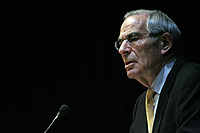Halberstam talks on Iraq, Vietnam
By Ben Weller

The past and the present seemed in perfect alignment Monday night as journalist-historian David Halberstam delivered a speech entitled “Iraq in the Shadow of Vietnam” to a capacity crowd at the Buskirk-Chumley Theater on Kirkwood Avenue.
Monday marked the fourth anniversary of the U.S. invasion of Iraq, and as war protesters in Bloomington and around the country held vigils in commemoration of fallen American soldiers and Iraqis, the man who won a Pulitzer at the age of 30 for his reporting from Vietnam gave his views on how America managed to repeat its mistakes of Vietnam in Iraq. The School of Journalism sponsored Halberstam’s visit as part of its Spring Speakers Series.
History is central to nearly all of Halberstam’s work. He said he came to be a historian through his work as a journalist in Vietnam.
“I became a historian because I went to cover a war and it didn’t work. So I busied myself finding out why it didn’t work.”
In 1973, he published The Best and the Brightest, a book describing how policy-makers in the Kennedy and Johnson administrations led America into deeper and deeper involvement in Vietnam. He has published 20 books to date, and his 21st, The Coldest Winter, will be released this fall. That book is about the Korean War, an event Halberstam called “a black hole of American history.”
In the course of his research and reporting for The Best and the Brightest, Halberstam learned what happens when the past is ignored. The failures of Vietnam, he said, reflected a failure among policy-makers to take into account the history of nationalism and revolution in that country. There, he said, the U.S. went to war against a group of political leaders in the North that who “true heroes” to their people for their defeat of the French.
He said that much the same thing happened in Iraq. There, as in Vietnam, the administration’s war planners had “miscalculated terribly on the attitude of the indigenous population and gotten completely wrong the ability of our opponents to thwart our will.”
In both wars, he said, American leaders thought that their military’s superior firepower would assure it of victory. But history is rife with examples of the limits of firepower against popular indigenous armies. Halberstam noted the French experience in Algeria as a lesson unheeded by Americans in both Vietnam and Iraq.
Halberstam called the current war in Iraq the “greatest foreign policy miscalculation of my lifetime,” a remark that drew uncomfortable laughs from the audience considering Halberstam made his name covering Vietnam.
Before and after Halberstam’s speech, a group of war protesters gathered outside the Monroe County Courthouse, just down the street from the Buskirk-Chumley Theater. Halberstam thanked the group for holding their vigil and noted its importance. But he also lamented what he called an “inadequate” level of protest toward the war nationwide.
Beth Brocchini, a physical therapist in the public schools, attended the pre-speech vigil. She said she hadn’t heard much about Halberstam’s work, but she planned to attend his speech nonetheless. She said the vigil and Halberstam’s speech were important forms of protest.
“It’s just time to speak out,” she said. “(The war) has been going on long enough.”
During a talk to the Bloomington Press Club earlier Monday, Halberstam noted the growing importance of media in shaping public opinion towards the war.
“As more power has accrued (in media), the struggle to control what the image is increases,” he said, adding, “It’s a helluva political struggle.”

